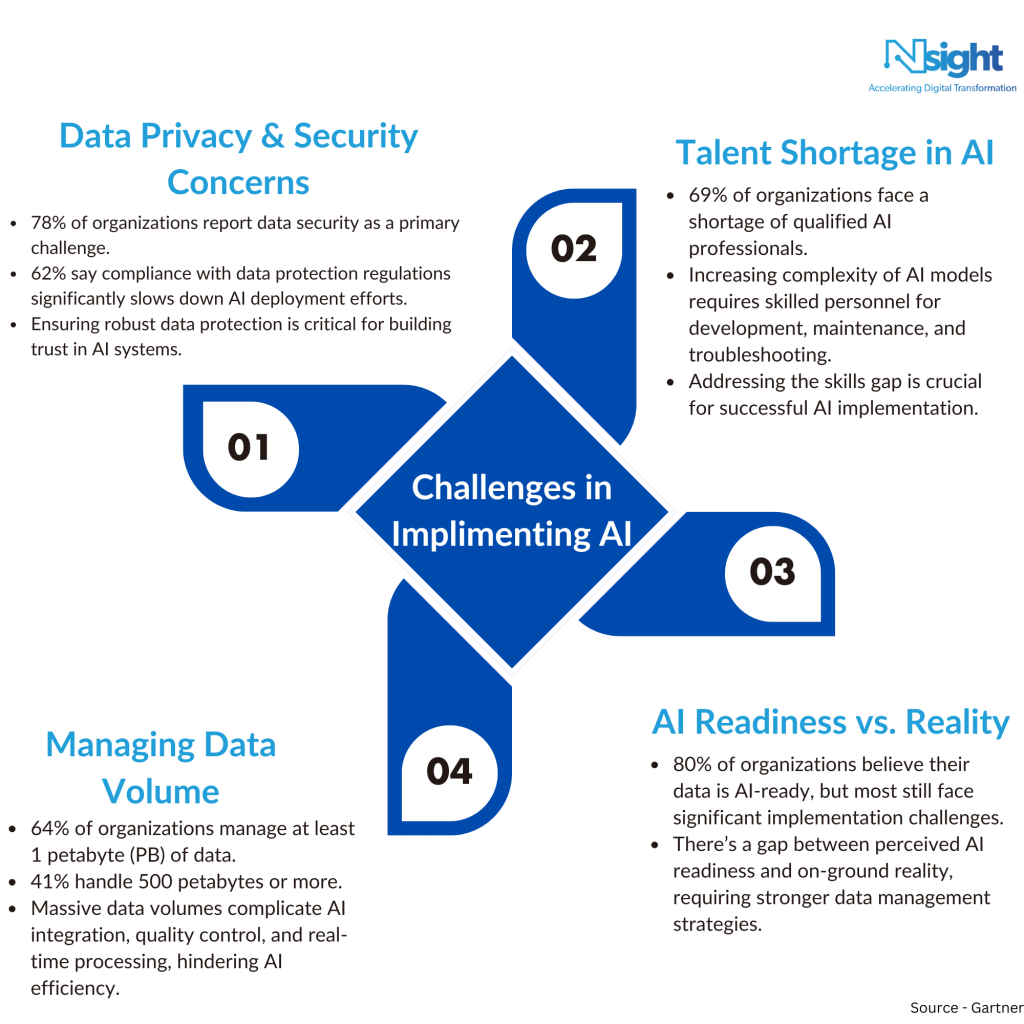Today, artificial intelligence (AI) has emerged as a powerful tool for innovation and operational efficiency. AI is reshaping how organizations function by automating repetitive tasks, optimizing workflows, and providing predictive insights. For executives, understanding and leveraging AI is no longer optional but essential to remain competitive and drive long-term growth.
Job Opportunities: Generative AI is set to impact 52% of jobs, creating new roles like AI product manager and prompt engineer, boosting productivity.
Economic Growth: Generative AI could add EUR 1.1 trillion in growth by 2032, with 13% of businesses adopting it in the next few years.
Productivity Gains: AI is driving 10-15% productivity improvement, with greater future potential.
Implementation Challenges: 78% of businesses address data security, and 69% are closing the AI talent gap for long-term success. (source)
AI’s integration into business operations can lead to transformative benefits that touch every aspect of an organization, from customer service to risk management. This blog will explore how AI can transform business operations and highlight key advantages for executives seeking to stay ahead in the market.

Here’s What You Will Learn in This Blog
Understanding AI in Business Operations
What is AI?
AI allows machines to think, learn, and solve problems like humans, transforming our daily lives
Critical components of AI include:
Machine Learning (ML): Algorithms that enable systems to improve performance based on data inputs without explicit programming.
Natural Language Processing (NLP): The ability of machines to understand and respond to human language.
Computer Vision: Empowering machines to perceive and decode visual information, transforming the way we interact with technology.
Robotic Process Automation (RPA): Automating routine and repetitive tasks using software bots.
For more information on how AI can benefit your business, contact us.
How AI Integrates into Business Operations
AI is already revolutionizing various aspects of business operations. It can be embedded across different functions to streamline processes, increase productivity, and improve decision-making.
Some key areas include:
Automation: AI automates routine tasks such as data entry, scheduling, and report generation, freeing employees to focus on strategic tasks.
Data Analysis: AI-driven algorithms process massive data sets to deliver valuable insights, helping companies make data-driven decisions.
Customer Service: AI-powered virtual assistants and chatbots enhance customer service by offering immediate, tailored responses to inquiries.
Key Benefits of AI for Executives
AI-Driven Job Growth and Displacement:
By 2030, U.S. demand for STEM and health jobs could grow 17-30%, adding 7M roles, while automation may reduce up to 3.7M jobs in food service and support.
The net-zero transition could displace 3.5M jobs in carbon-intensive sectors but create 4.2M new positions in renewables, EVs, and green construction, fueled by $400B in investments.
AI’s Impact on Energy Consumption:
Data centers, consuming 40% of their electricity for AI tasks, could double their energy use from 460 terawatt-hours in 2022 to 1,000 terawatt-hours by 2026, highlighting the growing energy demands of AI. (Source)
1. Enhanced Decision-Making
One of the most significant benefits of AI is its ability to enhance decision-making for executives.
Data-Driven Insights
AI systems can analyze vast amounts of data in real time, providing actionable insights that executives can use to make informed decisions. By identifying patterns and trends in business data, AI can uncover opportunities or challenges that might otherwise go unnoticed.
Predictive Analytics
AI can forecast trends by analyzing historical data, allowing executives to make strategic decisions confidently. Predictive analytics can also provide a competitive edge by enabling businesses to anticipate market shifts, customer behavior, and operational risks.
2. Improved Operational Efficiency
AI improves operational efficiency, helping companies optimize resources and reduce costs.
Automation
Imagine AI handling dull tasks, allowing us to focus on creativity and strategy. Welcome to the future of automation!
Process Optimization
AI-driven solutions analyze existing business processes and identify areas for improvement, ensuring that operations run smoothly and cost-effectively. For example, AI can optimize supply chain management by predicting demand patterns, optimizing inventory, and identifying potential bottlenecks.
3. Personalized Customer Experiences
In today’s customer-centric business landscape, personalization is critical to success. AI enables executives to deliver customized customer experiences, boosting satisfaction and loyalty.
Customer Insights
AI analyzes customer data, including preferences, purchasing patterns, and feedback, to generate personalized recommendations and solutions. This helps businesses offer products and services that align with individual needs.
AI-Driven Customer Support
AI-powered chatbots and virtual assistants provide 24/7 customer support, enhancing service efficiency and satisfaction by addressing inquiries in real-time. They can also escalate complex issues to human agents to ensure a smooth experience.
4. Risk Management and Compliance
AI is an invaluable tool for identifying risks and ensuring regulatory compliance.
Risk Identification
AI systems can analyze real-time data to identify potential risks, such as market volatility, security breaches, or operational inefficiencies. Predictive analytics will identify conceivable issues before they surge, giving executives time to mitigate risks.
Regulatory Compliance
AI can automate compliance monitoring by analyzing transactional data and identifying activities that may raise regulatory red flags. For example, in the financial sector, AI monitors transactions for signs of fraud, money laundering, or other illegal activities, ensuring companies comply with regulatory requirements.
5. Innovation and Competitive Advantage
AI fosters innovation by enabling businesses to explore new models, products, and services.
Fostering Innovation
AI allows businesses to innovate by experimenting with new business models and services that weren’t feasible before. AI-driven insights can lead to new product development, market expansion, and enhanced customer service models.
Staying Competitive
In a highly competitive business environment, rapidly adapting to changes is crucial. AI enables businesses to stay ahead by providing real-time insights into market trends, customer behavior, and emerging opportunities. By adopting AI, executives can ensure that their organizations remain agile and capable of responding to challenges faster than their competitors.
Challenges in Implementing AI
Data Privacy, Security, and Compliance
Despite 80% of organizations believing their data is AI-ready, 78% cite data security as a top challenge, with 62% struggling with compliance to regulations, which delays AI deployment.
Talent Gap and Skills Shortage – With 69% of organizations facing a shortage of qualified AI professionals, the complexity of AI models has exacerbated the need for skilled personnel for development, maintenance, and troubleshooting.
Data Volume and Integration
As 64% of organizations manage over 1 petabyte (PB) of data, handling massive data volumes and ensuring integration, quality control, and real-time processing presents significant hurdles in leveraging AI technologies effectively. (Source)

While AI offers numerous advantages, implementing it comes with its own set of challenges.
Data Privacy and Security: AI systems rely heavily on data, making them vulnerable to breaches and misuse. Ensuring the security of customer and business data is critical, and organizations must comply with data privacy regulations such as GDPR or CCPA.
Integration with Existing Systems: Integrating AI into legacy systems can be complex and costly. Many organizations face challenges in modernizing their IT infrastructure to accommodate AI-driven solutions. Seamless integration is essential to avoid disruption in operations.
Talent and Expertise: The development and deployment of AI solutions require skilled professionals, including data scientists, machine learning engineers, and AI strategists. However, a shortage of AI talent makes it difficult for businesses to find the right expertise to manage AI projects effectively.
Steps for Executives to Get Started with AI
A structured approach is crucial for executives leveraging AI for their business operations.
Here’s how to get started:
Assessing Readiness: Before adopting AI, executives must evaluate whether their organization is ready for this transformation. A few steps to assess readiness include:
Reviewing Current Infrastructure: Do existing systems support AI integration?
Analyzing Data: Is the company collecting the right data, and is it clean and structured for AI analysis?
Identifying Business Goals: What problems does the company aim to solve with AI?
Building an AI Strategy
A comprehensive AI strategy should align with the organization’s long-term goals.
This strategy should consider:
Budget and Resources: Allocating sufficient budget and resources for AI development and deployment.
KPIs and Success Metrics: Setting clear key performance indicators (KPIs) to measure the success of AI initiatives.
Investing in AI Talent and Infrastructure
AI success depends on having the right talent and infrastructure.
Businesses must:
Hire or Train AI Experts: Invest in recruiting or upskilling employees with AI expertise.
Modernize IT Infrastructure: Ensure systems are equipped to handle the complexity and scale of AI applications.
Conclusion
AI is no longer a futuristic technology—it’s a present-day necessity for businesses aiming to thrive in a competitive marketplace. AI offers executives numerous benefits, from enhanced decision-making to improved operational efficiency and risk management. However, successful AI adoption requires careful planning, investment in the right talent, and a commitment to data privacy and security. Executives who prioritize AI in their strategy will drive innovation, stay competitive, and achieve sustainable growth. Nsight helps executives unlock AI’s full potential by delivering customized solutions that align with their strategic goals. Now is the perfect time to explore AI opportunities with Nsight, positioning your organization at the forefront of digital transformation.
To learn more about how we can help you build a successful AI strategy.
About the Author

Deepak Agarwal, a digital and AI transformation expert with over 16 years of experience, is dedicated to assisting clients from various industries in realizing their business goals through digital innovation. He has a deep understanding of the unique challenges and opportunities, and he is passionate about using cutting-edge technologies to solve real-world business problems. He has a proven track record of success in helping clients improve operations, increase efficiency, and reduce costs through emerging technologies.





